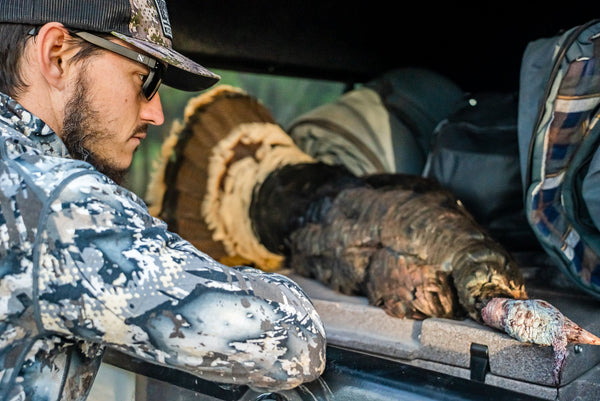Seasonal Turkey Hunting Gear Guide: How to Gear Up for Spring and Fall Hunts
Dec 20, 2024
Whether you’re chasing the gobbles of a spring tom or tracking a flock in the fall, having the right gear can make or break your turkey hunting experience. Turkey behavior and environmental conditions vary significantly between these two seasons, and your gear needs to adapt accordingly.
In this guide, we’ll cover everything you need to know about gearing up for both spring and fall turkey hunts — from clothing and calls to decoys and shotguns. Let’s ensure you’re ready to bag a bird no matter the season.
Explore Our Turkey Bundles
SKRE Gear® has everything from camo apparel to essential accessories, all in one convenient package designed to maximize your hunting experience.
Shop Turkey Bundles
Understanding the Differences Between Spring and Fall Turkey Hunting
Turkey Behavior in Each Season
-
Spring: This is mating season, and toms (male turkeys) are more vocal and responsive to calls. They’re actively searching for hens and are more likely to come into decoys and calls.
-
Fall: Turkeys are focused on feeding and flocking together. The hunting strategy shifts to locating and breaking up flocks, then calling them back together.

Environmental Differences
-
Spring: Expect mild temperatures, new growth, and frequent rain showers.
-
Fall: Cooler mornings, warmer afternoons, and changing foliage, with potential frost or early snow.
Knowing these differences helps you adjust your gear for each season.
Essential Gear for Spring Turkey Hunting
1. Clothing and Camouflage
Spring weather is unpredictable, so focus on versatility and comfort.
-
Lightweight, Breathable Layers: Opt for moisture-wicking base layers made from merino wool or synthetic materials to stay dry and comfortable.
-
Spring Camo Patterns: Choose green and brown tones to blend in with budding foliage.
-
Rain Gear: A waterproof jacket and pants are essential for handling spring showers.
Recommended Gear:
-
Base Layer: SKRE Gear Wasatch Crew Top
-
Outer Layer: SKRE Gear Nebo Rain Jacket
-
Boots: Waterproof, breathable boots like the LaCrosse Alpha Burly Pro
2. Turkey Calls
Spring toms are vocal and respond well to calls that mimic hens.
-
Box Calls: Loud and easy to use, perfect for long-distance calling.
-
Slate Calls: Great for producing a range of sounds, from soft clucks to loud yelps.
-
Mouth Calls: Hands-free option for close encounters.
3. Decoys
Spring turkeys are territorial and responsive to decoys that mimic hens and jakes.
-
Hen Decoys: To attract toms looking for mates.
-
Jake Decoys: To trigger the dominance instincts of mature toms.
Setup Tips: Place decoys in an open area within shooting range, ensuring they are

visible but not too close to your hiding spot.
4. Shotgun and Ammunition
-
Shotgun: A 12- or 20-gauge shotgun with a turkey-specific choke.
-
Ammunition: Use #4, #5, or #6 shot for a dense pattern that ensures a clean kill.
5. Accessories
-
Turkey Vest: Essential for carrying calls, decoys, and other gear.
-
Binoculars: For spotting turkeys from a distance.
-
Face Mask and Gloves: To keep your hands and face concealed.
Explore Our Turkey Bundles
SKRE Gear® has everything from camo apparel to essential accessories, all in one convenient package designed to maximize your hunting experience.
Shop Turkey Bundles
Essential Gear for Fall Turkey Hunting
1. Clothing and Camouflage
Fall conditions can be cold, so layering is key.
-
Layered Clothing: Start with moisture-wicking base layers and add insulating mid-layers.
-
Fall Camo Patterns: Browns, tans, and muted colors match autumn foliage.
-
Insulated Gear: For chilly mornings and late-season hunts.
Recommended Gear:
-
Base Layer: SKRE Gear Kaibab 150 Short Sleeve
-
Mid-Layer: SKRE Gear 300 Merino Wool Hoodie
-
Outer Layer: SKRE Gear Grid Lite Jacket
2. Turkey Calls
Fall turkeys require different calling strategies since they’re focused on flocking.
-
Locator Calls: Owl hooters or crow calls help you locate flocks.
-
Hen and Gobbler Calls: Mimic the sounds of a scattered flock to call them back together.
Techniques: Use soft yelps and clucks to imitate flock sounds and reassure cautious birds.
3. Decoys
Fall hunting focuses on flock behavior, so your decoy strategy should reflect that.
-
Flock Decoys: Mimic a group of feeding turkeys to put approaching birds at ease.
Placement Tips: Set up decoys near feeding areas like fields or clearings.
4. Shotgun and Ammunition
-
Shotgun: Same 12- or 20-gauge shotgun setup as spring.
-
Ammunition: #4 or #5 shot works well for fall flocks.
5. Accessories
-
Blinds: Portable blinds help conceal movement when waiting for flocks.
-
Warm Boots: Insulated, waterproof boots for damp and cold conditions.

Must-Have Gear for Both Seasons
-
Binoculars: For scouting and identifying turkeys at a distance.
-
Face Masks and Gloves: Essential for staying concealed.
-
Backpack or Turkey Vest: For carrying calls, decoys, snacks, and water.
-
First Aid Kit: Safety essentials for any hunt.
-
Range Finder: Helps estimate distances for accurate shots.
Tips for Maintaining Your Turkey Hunting Gear
1. Clothing Care
-
Washing: Use scent-free detergent to clean camo clothing.
-
Waterproofing: Reapply waterproof treatments to rain gear as needed.
2. Call Maintenance
-
Box and Slate Calls: Keep dry and clean. Condition slate surfaces regularly.
-
Mouth Calls: Store in a ventilated case to prevent mold.
3. Shotgun Care
-
Clean Regularly: Clean and oil your shotgun after each hunt to prevent rust.
-
Check Chokes: Ensure the chokes are tightened and clean.
Conclusion
Spring and fall turkey hunting each comes with unique challenges, but with the right gear, you can be prepared for both seasons. From lightweight layers and waterproof gear in the spring to insulated clothing and flock calls in the fall, choosing the right equipment is key to success.
Gear up for your next turkey hunt with confidence! Explore our recommended gear now at skre.ca.



